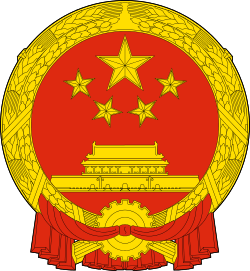1975 Constitution of the People's Republic of China
 |
| This article is part of a series on the politics and government of China |
|
|
The 1975 Constitution of the People's Republic of China was promulgated in the midst of the unrest of the Cultural Revolution by the 4th National People's Congress. The office of President of the People's Republic of China was officially scrapped under the Constitution.
This Constitution reduced the total number of articles to just around thirty, compared to 106 of articles in the 1954 Constitution of the People's Republic of China.
Consistent with the time it was issued, the flavour of the Cultural Revolution is quite visible. The Preamble ends with a slogan to struggle for new successes. Language such as "dictatorship of the proletariat", "social imperialism" and "proletarian internationalism" appears in many places in the document.
Individual rights, such as the rights of freedom of speech, are guaranteed, but only to those loyal to the Communist Party of China.
The 1975 Constitution witnessed an integration (in part) of the State Constitution (the PRC Constitution) and the Chinese Communist Party. The Constitution states that the People's Liberation Army, the armed services of the PRC, is to be controlled by the Central Committee of the Communist Party of China and Chairman of the Communist Party of China. Such linkage between party and state would no longer be seen in later Constitutions, particularly after 1982. The most significant link, however, came in Article 2, which stated that the Chinese Communist Party was the leading force of the Chinese people.
Looking back on the 1975 Constitution, books in mainland China call it "a socialist Constitution with serious errors." This Constitution was superseded in 1978 by the 1978 Constitution of the People's Republic of China. It remained in effect for about three years, the shortest-lived constitution in the People's Republic of China's history.